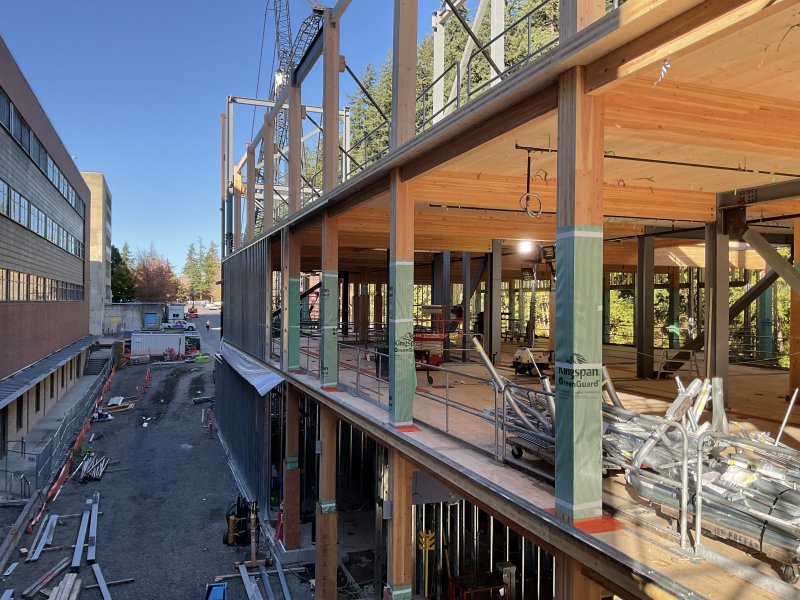'Topping out' ceremony for Kaiser Borsari Hall set for Nov. 17
Imagine designing an experiment with a faculty mentor and then gathering real time data from the building where you’re working to test your hypothesis. Or working to find solutions for slowing climate change or mitigating its effects in a building designed to support those goals and demonstrate possible paths forward. Imagine collaborating with industry leaders to understand real world challenges as you hone your engineering or programming skills or craft energy policy for a better future.
Kaiser Borsari Hall, Western’s new electrical and computer engineering, energy science, and computer science building, will offer these unique opportunities to students across disciplines with its net zero energy and carbon design, state-of-the-art labs and experiential learning spaces, active learning classrooms, and collaboration spaces.
Construction on Kaiser Borsari Hall began in the spring of 2023 and will mark an important milestone with its “topping out” ceremony on Nov. 17. The ceremony celebrates the placement of the last structural beam in the building. Members of the project team and other stakeholders traditionally sign the final beam before it is flown through the site on a crane and installed.
The building is designed to exceed LEED standards for energy use, carbon, and other environmental indicators, and will pursue Living Building Challenge Energy Petal Certification through the International Living Future Institute. When complete, it will be the region’s first publicly funded carbon-neutral academic building on a state university campus.
The building will be a living laboratory that integrates Electrical Engineering, Computer Science, and the Institute for Energy Studies into a shared facility where students learn from their own building about innovative materials and energy technologies. Energy use is reduced by 82%, and solar panels cover over 75% of the roof area to maximize the energy potential on the site. With a mass timber structure, the embodied carbon is reduced by 63% while enhancing the biophilia experience of the occupants. The commitment to a healthy planet extends to water and native plant landscaping with a 78% reduction of outdoor water use.
When designating Western as one of the first cohort of twelve “Zero Energy Design Designation” awardees, Carolyn Snyder, deputy assistant secretary for Energy Efficiency with the U.S. Department of Energy said, “Our fight against climate change runs straight through our nation’s buildings, and the forward-looking college and university programs we honored today are paving the way for students to lead our net-zero greenhouse gas emissions future.”
Housing electrical engineering, computer science, and energy science within a building that demonstrates a commitment to leadership in addressing climate change and energy challenges and uses cutting-edge technology to achieve its goals will provide tools to train and support future innovators and leaders in these fields.
Kaiser Borsari Hall is being funded through both public and private funds and is named for Fred Kaiser and Grace Borsari, longtime friends and champions of Western, who have committed $10 million to the campaign to fund the project, alongside state appropriated funds. The architects are Perkins&Will, with design consulting by Jason McLennan, founder of the International Living Futures Institute. The General Contractor / Construction Manager is Mortenson Construction. Construction will continue through 2024, with completion expected early in 2025.
